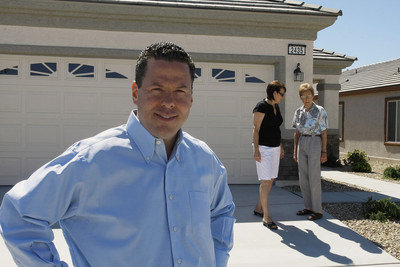Real estate expert holds free education seminars on short sales
Until about a year ago, having to sell a home in the Las Vegas Valley for less than its purchase price seemed as unlikely as snow falling in July -- but today the short sale is being regarded by more and more strapped homeowners as the best of a handful of bad options. Selling for less than one owes on a mortgage loan, usually to avoid foreclosure, is the definition of a short sale. Those who are considering doing it are advised to seek out the counsel of an experienced real estate pro such as Mark Stark, chief executive officer of Prudential Americana Group of Las Vegas.
Stark's firm helps homeowners understand the intricacies of a short sale, including personal credit impact and tax liability issues. Just as importantly, Prudential Americana helps people giving up a home position themselves to make good decisions going forward, which ultimately leads to amassing the resources to buy a home and build wealth in the future, according to Stark.
Prudential Americana periodically offers free seminars to the public in which Stark begins by defining a short sale as selling a piece of property for "less than you owe to the bank. It doesn't matter whether it's $10 or $10 million." The objective, he said, is always the same: "To get you out of this property with as little pain as possible."
When it comes to possibly doing a short sale, the first step is to learn about the process and then make a formal request to your lending institution, he said.
In a short sale, a lending institution that holds the loan is asked to let the homeowner sell the property although it's certain to bring less than the amount the borrower owes. A short sale saves the bank the trouble of moving ahead with foreclosure, while sparing the homeowner from damaged credit and the anxiety of forced removal from the home.
In some cases, the bank might ask the homeowner to participate in the loss. For example, a homeowner with a remaining loan balance of $400,000 might be able to sell his or her home for only $300,000 in today's market. The bank might approve such a sale on the condition that the homeowner also sign a note to pay, say, $15,000 or $20,000 in the years ahead.
"We will do our best to mitigate or negate this from happening," Stark said, while noting it is common that lenders ask short sellers to share in the loss.
Some overextended homeowners have simply walked away from houses in recent months, but Stark advises his clients that walking away is not nearly as simple as some might have you believe. First of all, many of the loans made in the boom were of the interest-only variety, which means a first-mortgage lender held 80 percent of the loan and a second note for the balance was held by a separate lender. In the event of a foreclosure or a homeowner walking away with zero equity, the holder of the first mortgage gets the house to resell to recoup his losses. The holder of the 20 percent portion of the loan invariably sues the homeowner to recover his portion of the loan.
"That debt will be hanging over your head," Stark warned.
When it comes to dealing with compromised credit, Stark reminds his clients that damaged credit is always a "temporary" condition that can be remedied.
"There's no such thing as 'destroying' your credit," Stark told an audience gathered in a conference hall at the Red Rock Casino Resort in late April.
For more information, call 318-4042 or visit markstarkceo.com.

















